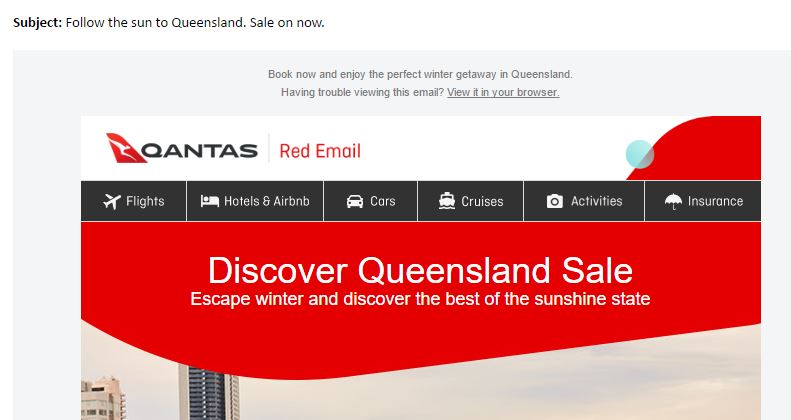Qantas sent an email to my wife to promote their travel luggage sale.
The email has a photo of a man and a woman riding a motor scooter along a road beside a river somewhere. Neither of them are wearing a helmet. The woman is holding a large case which is hanging behind her.
Great safety message from the “world’s safest airline”. Not.
Seems to be a generic image they’ve used from another site. It’s a global company rules are different in other places. What we think is unacceptable is probably normal elsewhere.

My thoughts as well.
Extremely succinct…
@Fred123, I’m always interested to see what whacky ads are coming out so thanks for sharing it. Well done @omy005aw for finding that image too. We appreciate all the comments, so feel free to share your opinion.
For me, I think that it’s pretty easy for advertisers to get away with almost anything. According to this list from The Australian, even the ads receiving the most complaints are usually allowed to run regardless of potential detriment. In fact, creating a controversial ad will probably improve the results, especially if measurements like media items or ‘social reach’ are any indicator.
A recent example is the Pepsi ‘Moments’ campaign, which faced ‘major backlash’ after an ad earlier in the year. The ad generated nearly 22,000% increased mentions(not a typo), and while the sentiment is mostly negative, ratings agency Fitch recently indicated growth of 3-4% for PepsiCo on a $63 billion dollar payload. The specific product Pepsi cola also continues to rank among the top in most polls and studies.
I think this is because short-term sentiment doesn’t necessarily affect consumer behavior in a meaningful way, and long term, most people remember a brand or logo after they forget an ad that annoys, offends or promotes unsafe behaviour. I have no data on hand to prove the theory, but can you remember more than one or two terrible ads from a year ago without a prompt? I’ll bet those same brands continue to be recognised though.
Censorship is equally ugly, easily subverted and unlikely to be the solution in most cases (it would likely help ad campaigns), which puts any regulator operating on some dusty standards guidelines in a tricky spot. However, regardless of where we each stand on any one particular issue, do we really want companies subverting our social, cultural and safety concerns for profit, or in other cases propagating discrimination or bias in an underhanded way to push products? Purchasing decisions are already hard enough before you start long-term and effective consumer boycotts across large companies too.
I’d say the best-case scenario is for networks to better manage their ad content, especially when it comes to matching ads with audiences. The networks will be the ones who suffer from the situation in the long term, as it’s easier to switch channel than it is to stop buying Pepsi. Plus, ad blockers are already working hard to destroy media business models, and the same networks should realise that terrible ads push people in this direction or to ad-free alternatives.
If you’re getting direct communications from a brand, it might be worth contacting them with feedback after a bad ad if you want to keep receiving things from them. Alternatively, this advice from The Simpsons could be the solution for a lot of these issues, 'Just don’t look".
A Community member sent me this via email. It’s an offer from Qantas to ‘escape winter’ to the sunshine state. However, the flight dates are restricted to January - March. By the time you fly, winter will be long gone.
Would be interested to hear your thoughts.
I suppose it is winter in the northern hemisphere at that time, but, it is very poor proofing but their communications section.
Good point @phb, I hadn’t thought of that. It may depend on how much info is in their database on each customer I suppose
